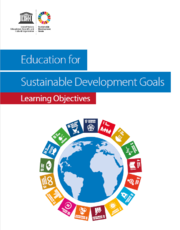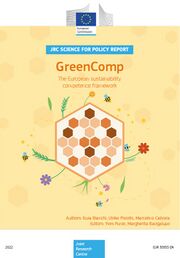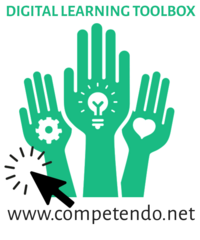Contents
- 1 Education for Sustainable Development (ESD)
- 2 Sustainable Development: Definition
- 3 Video: What is Education for Sustainable Development?
- 4 GreenComp - EU Competence Framework
- 5 Articles, Checklists and Methods
- 6 Materials: Education for Sustainable Development/ Global Learning
- 7 All Methods:
- 8 Standard Building Blocks:
- 9 Educational Fields:
- 10 Download: Banner
Education for Sustainable Development (ESD)
Empowers learners with knowledge, skills, values and attitudes to take informed decisions and make responsible actions for environmental integrity, economic viability and a just society. UNESCO.
A detailed description of Education for Sustainable Development's learning objectives can be found in the brochure: ESD Learning Objectives
The subject of Education for Sustainable Development (ESD) is defined by the term "sustainability", coined by the United Nations Commision "Our Common Future". Although environmental issues are central to this approach to education, this definition shows that they are not the sole core. Sustainability here is related to the environment, the social, the economic. In addition, "development" refers to the fact that ESD is a transformative approach to education - towards a more sustainable world.
This also shows how strongly ESD is linked to active citizenship education, the commitment to a democratic and sustainable society.
Video: What is Education for Sustainable Development?
GreenComp - EU Competence Framework
The European sustainability competence framework, created in 2022 by the European Commission/Joint Research Centre.
GreenComp identifies a set of sustainability competences to feed into education programmes to help learners develop knowledge, skills and attitudes that promote ways to think, plan and act with empathy, responsibility, and care for our planet and for public health Download.
1. Embodying sustainability values
- 1.1 Valuing sustainability. To reflect on personal values; identify and explain how values vary among people and over time, while critically evaluating how they align with sustainability values.
- 1.2 Supporting fairness. To support equity and justice for current and future generations and learn from previous generations for sustainability.
- 1.3 Promoting nature. To acknowledge that humans are part of nature; and to respect the needs and rights of other species and of nature itself in order to restore and regenerate healthy and resilient ecosystems.
2.1 Systems thinking
- 2.1 Embracing complexity in sustainability. To approach a sustainability problem from all sides; to consider time, space and context in order to understand how elements interact within and between systems.
- 2.2 Critical thinking. To assess information and arguments, identify assumptions, challenge the status quo, and reflect on how personal, social and cultural backgrounds influence thinking and conclusions.
- 2.3 Problem framing. To formulate current or potential challenges as a sustainability problem in terms of difficulty, people involved, time and geographical scope, in order to identify suitable approaches to anticipating and preventing problems, and to mitigating and adapting to already existing problems.
3. Envisioning sustainable futures
- 3.1 Futures literacy. To envision alternative sustainable futures by imagining and developing alternative scenarios and identifying the steps needed to achieve a preferred sustainable future.
- 3.2 Adaptability. To manage transitions and challenges in complex sustainability situations and make decisions related to the future in the face of uncertainty, ambiguity and risk.
- 3.3 Exploratory thinking. To adopt a relational way of thinking by exploring and linking different disciplines, using creativity and experimentation with novel ideas or methods.
4. Acting for sustainability
- 4.1 Political agency. To navigate the political system, identify political responsibility and accountability for unsustainable behaviour, and demand effective policies for sustainability.
- 4.2 Collective action. To act for change in collaboration with others.
- 4.3 Individual initiative. To identify own potential for sustainability and to actively contribute to improving prospects for the community and the planet.
Materials: Education for Sustainable Development/ Global Learning
GreenComp
The European sustainability competence framework
PDFHow to Engage Citizens with the Sustainable Development Goals
Inspiration, tools and cases by Finnish Development NGOs Fingo
PDFSustainability and Bildung
Created in European Association for the Education of Adult's Bildung project
PDFTen Steps to Systems Thinking
Education for Sustainable Development online manual for teachers, educators, and facilitators by Centre for Environmental Education
WebHandbook: Sustainable Entrepreneurship
Non-formal education methods collected in the project Growing Green by Fora Copenhagen.
PDFGlobal Citizenship Education
Wintersteiner, Grobbauer, Diendorfer, Reitmair-Juárez
Citizenship Education for Globalizing Societies
DownloadSix Steps to Global Citizenship
A Guide for Youth Workers, Youth Leaders and Trainers
PDFGlobal Youth Work
Allen, Dwyer
Activities for Global Citizenship
DownloadThe Everyday Beyond
European, international and global dimensions of learning processes.
DownloadSherpa Tools
Polish-German Youth office's online tools for Education for Sustainable Development in German and Polish
WebGlobal citizenship education in a digital age: teacher guidelines
UNESCO, 2024
PDFEnvironment and Civil Involvement
How Can We Connect Education for Sustainable Development and Active Citizenship Empowerment? DownloadESD Toolbox
UNESCO's ESD Toolbox WebYouth Xchange towards sustainable lifestyles
UNEP and UNESCO Toolbox WebGlobal Education Guidelines
Concepts and methodologies on global education for educators and policy makers of the Council of Europe DownloadGlobal Citizenship Education
Topics and Learning Objective by UNESCO
PDFEducation for Sustainable Development Learning Goals
UNESCO's learning goals on ESDPDFPISA Global Competence Framework
OECD's Global Competence Model PDFT-KIT 13 - Sustainability and youth work
E. Keen, J. Pinkeviciute, A. Hayes, A. Berecz, B. Akyüz for CoE/EUC PDF
























